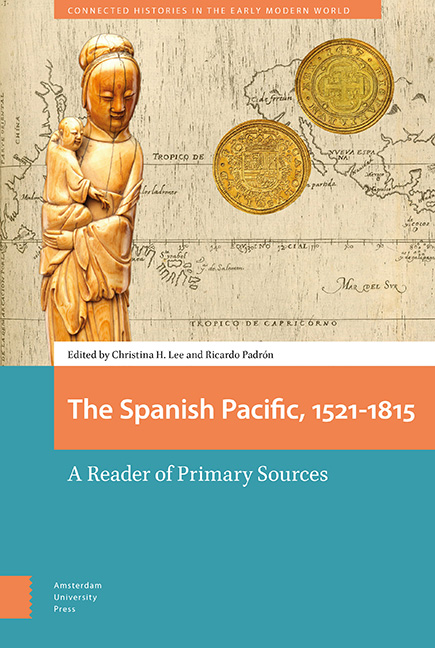Book contents
- Frontmatter
- Contents
- Abbreviations
- Acknowledgements
- Introduction
- 1 An Early Transpacific Account of the Spice Islands by Andrés de Urdaneta (1536)
- 2 Domingo de Salazar’s Letter to the King of Spain in Defense of the Indians and the Chinese of the Philippine Islands (1582)
- 3 Juan Cobo’s Map of the Pacific World (1593)
- 4 A Royal Decree of Philip III Regulating Trade between the Philippines and New Spain (1604)
- 5 Manila’s Sangleys and a Chinese Wedding (1625)
- 6 Don Luis Castilla Offers to Sell Land in Manila (1629)
- 7 Idolatry and Apostasy in the 1633 Jesuit Annual Letter
- 8 The Will of an Indian Oriental and her Chinos in Peru (1644
- 9 Francisco de Combés’s History of Mindanao and Jolo (1667)
- 10 Between Fiction and History in the Spanish Pacific The Misfortunes of Alonso Ramírez (1690)
- 11 A Moluccan Crypto-Muslim before the Transpacific Inquisition (1623–1645)
- 12 Constitutions and Rules of the Beatas Indias (1726)
- 13 The Poetics of Praise and the Demands of Confession in the Early Spanish Philippines: Notes and Documents
- 14 The Pacific Theater of the Seven Years’ War in a Latin Poem by an Indigenous Priest, Bartolomé Saguinsín (1766)
- 15 A Prohibition on Digging Up the Bones of the Dead (1813)
- Index
11 - A Moluccan Crypto-Muslim before the Transpacific Inquisition (1623–1645)
Published online by Cambridge University Press: 20 November 2020
- Frontmatter
- Contents
- Abbreviations
- Acknowledgements
- Introduction
- 1 An Early Transpacific Account of the Spice Islands by Andrés de Urdaneta (1536)
- 2 Domingo de Salazar’s Letter to the King of Spain in Defense of the Indians and the Chinese of the Philippine Islands (1582)
- 3 Juan Cobo’s Map of the Pacific World (1593)
- 4 A Royal Decree of Philip III Regulating Trade between the Philippines and New Spain (1604)
- 5 Manila’s Sangleys and a Chinese Wedding (1625)
- 6 Don Luis Castilla Offers to Sell Land in Manila (1629)
- 7 Idolatry and Apostasy in the 1633 Jesuit Annual Letter
- 8 The Will of an Indian Oriental and her Chinos in Peru (1644
- 9 Francisco de Combés’s History of Mindanao and Jolo (1667)
- 10 Between Fiction and History in the Spanish Pacific The Misfortunes of Alonso Ramírez (1690)
- 11 A Moluccan Crypto-Muslim before the Transpacific Inquisition (1623–1645)
- 12 Constitutions and Rules of the Beatas Indias (1726)
- 13 The Poetics of Praise and the Demands of Confession in the Early Spanish Philippines: Notes and Documents
- 14 The Pacific Theater of the Seven Years’ War in a Latin Poem by an Indigenous Priest, Bartolomé Saguinsín (1766)
- 15 A Prohibition on Digging Up the Bones of the Dead (1813)
- Index
Summary
Abstract
In 1623 and again in 1643, a Moluccan soldier by the name of Alexo de Castro became one of the few individuals to be shipped from Manila to Mexico to face trial by the Inquisition, which operated out of New Spain. In the trial documents, we learn of his life as a mestizo of Portuguese and Southeast Asian lineage who traveled from the Moluccas to Goa and then to Manila in the course of his career as a soldier. We also learn of this mestizo's alleged adherence to the practice of Islam and hear the voices of the women who accused him of sexual assault. Ryan Dominic Crewe places the document in the context of institutional history and in that of the global mestizaje characteristic of Iberian maritime imperialism.
Keywords: Inquisition; Islam; mestizaje; women; sexual assault
In 1623, a Moluccan soldier named Alexo de Castro was arrested by authorities of the Holy Office of the Inquisition in Manila. Denounced by his wife, Ynés de Lima, for secretly observing the Muslim faith in Manila, Castro faced inquisitorial investigations that initially were inconclusive. Alexo de Castro was released. Two decades later, Ynés de Lima and her slave María de Lima denounced Alexo de Castro for secretly observing Islam in Manila, for sexually abusing women in his household, and for making heretical statements regarding fornication. Considering this alleged crypto-Muslim a threat to Christianity society, inquisitors sent him to Mexico City, the seat of the inquisitorial district of which the Philippines was a part, for trial. Castro was ultimately tried, found guilty, and sentenced to perpetual confinement in a monastery in Mexico City for the remainder of his life.
The Inquisition trials of Alexo de Castro are valuable to the history of the early modern Hispano-Asian Pacific world on several levels. In institutional terms, the case is entirely unique: the Comissariat of the Inquisition in Manila was a branch of the Holy Office that reported to the Tribunal of the Inquisition based in Mexico City, which throughout the early modern period retained its exclusive authority to conduct trials and issue sentences. The fraught logistics of the transpacific galleon links between the Philippines and Mexico all but guaranteed that very few inquisitorial prisoners would ever be sent to Mexico for trial.
- Type
- Chapter
- Information
- Spanish Pacific, 1521–1815A Reader of Primary Sources, pp. 171 - 188Publisher: Amsterdam University PressPrint publication year: 2020



